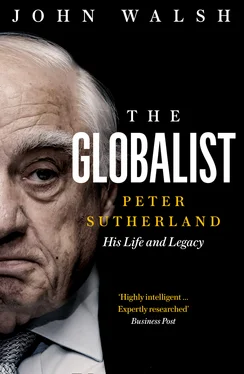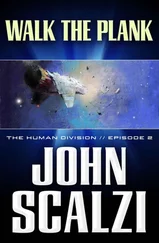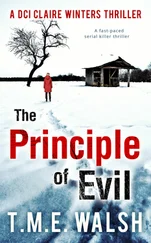The case of Dominic ‘Mad Dog’ McGlinchey happened under Sutherland’s watch. Formerly a member of the IRA, McGlinchey had transferred to the INLA in the early 1980s. Even by the standards of the time, he was a particularly violent individual – he claimed in a 1983 interview that he had been responsible for at least thirty murders, and was believed to have been responsible for the 1982 Ballykelly disco bombing which claimed the lives of six British soldiers and eleven civilians. In 1981, extradition proceedings had commenced when a warrant was issued by Ballymena District Court on 24 June. Laurence Wren, the deputy commissioner of An Garda Síochána, endorsed the warrant for execution in the state. McGlinchey, at that point still in Portlaoise prison, challenged the process, claiming that the offence specified in the warrant was ‘political’ and that once extradited, he would also be charged with other offences of a political nature.
McGlinchey’s case was heard in the High Court on 17 May 1982. By the time of the appeal he had been released from prison and was living at an address in Dublin, at Colliers Avenue, Ranelagh. After Mr Justice Gannon dismissed the appeal on the grounds that no evidence had been presented to substantiate the ‘political’ nature of the offence, the case was taken to the Supreme Court. Here, McGlinchey’s counsel abandoned the ‘political’ defence to the original offence, relying instead on the argument that there were substantial grounds for believing that if extradited he would be prosecuted for political offences. The appeal was again dismissed. Although ‘political offence’ had not been claimed, the Chief Justice went out of his way to assert that terrorism had rendered obsolete many judicial authorities on political offence, and that the burden of proof in establishing whether an offence was political or not should rest, not with the offence, but in the particular circumstances of specific cases and ‘what reasonable, civilised people would regard as political activity’. The judge ruled that the plaintiff had failed to prove his case.
Sutherland wrote in his private papers that in the context of extradition law, and in the wider contexts of the Irish political landscape, cross-border and Anglo-Irish relations, this was a landmark judgment:
Chief Justice O’Higgins’ ruling effectively removed the motivation of individual perpetrators from consideration and tilted the balance toward the specific nature of the case. The case did not produce a flood of extraditions. Edgar Graham’s exaggerated claims of ‘safe haven’ were unfounded. But the case was a significant step in shaping public perception and political opinion at a very delicate moment in our history.[1]
McGlinchey skipped bail during the hearing, but he was subsequently apprehended in March 1984 following a gun battle with Garda’. In a last-ditch attempt to avoid his removal to the North, his legal team sought an injunction from the High Court to place a stay on his extradition pending a further appeal on grounds that the Extradition Act 1965 was unconstitutional and the original warrant issued by the District Court in Ballymena had expired. When Judge Barrington granted the injunction, on the afternoon of Saturday 17 March, Sutherland convened a sitting of the Supreme Court on the same night.
It was a controversial move. In his judgment, the Chief Justice had recognised McGlinchey’s right to lodge an appeal; however he noted that, as the original case had been based on an appeal for protection under the Extradition Act, it was a cynical abuse of process to now seek to challenge the constitutionality of that legislation. He dismissed the appeal and noted that as the Extradition Act was a complete piece of legislation it could not be limited by the rules of a district court in another jurisdiction. McGlinchey was immediately extradited to Northern Ireland.
Sutherland’s decision to order the Supreme Court to sit on a Saturday night divided opinion in the Law Library. When Tom O’Higgins contacted Brian Walsh on Saturday afternoon to check whether he was available for a sitting of the Supreme Court that evening,[2] Walsh said that he was available but he opposed the extradition. He was not contacted again. O’Higgins subsequently said that he had already enlisted Justice Henchy and Justice Griffin and therefore did not need Walsh’s services.
There was a considerable backlash against the move. A colleague of Sutherland’s at the Law Library at the time comments: ‘I had reservations about Sutherland’s McGlinchey decision where he got the Supreme Court to sit at night on St Patrick’s Day in the cold and the dark.’ Tom O’Higgins, he says, was a deeply conservative figure who was sitting as the Chief Justice at that time, and who, regarding an application to have McGlinchey sent to the North immediately, would have been ‘the right judge to make that application to’.
‘A lot of people were concerned that this was done at night, on St Patrick’s Day, without any opportunity for the issue to be adjudicated upon in a calm way in the full light of day,’ said one of Sutherland’s former Law Library colleagues. The view from this colleague was that Sutherland wanted it done quickly and promptly.
‘It’s not an illegitimate view. I didn’t agree with it. I’m not saying he was wrong, I’m just saying we would have had a divergence of view. But it’s again an indication of Peter’s approach to things. There certainly would have been – and still to this day there would be – a body of opinion that wouldn’t have agreed with his stance on that, but it’s another example of Peter acknowledging that there was already a decision of the court in relation to the issue and all that he was doing now was copper-fastening it: get this thing done, we need it done quickly, let’s move on before a head of steam builds up for the opposition,’ added Sutherland’s former Law Library colleague.
The Anglo-Irish Agreement was designed and negotiated by another cabinet sub-committee, comprising Taoiseach Garret FitzGerald, Minister for Foreign Affairs Peter Barry, justice minister Michael Noonan, Tánaiste Dick Spring and attorney general Sutherland. ‘Within that group Peter was influential,’ Noonan says. ‘We met regularly for a long time. Peter had very good insights and contacts. His relationship with Havers was particularly important.’
Noonan attended a meeting in London with Tom King, the former Secretary of State for Northern Ireland, whom he told about the change of position on extradition. ‘He was absolutely delighted. He left the room to make a phone call, I presume to Thatcher. As a government, the two Peters, myself and Garret and Dick were ad idem on this. We all wanted legal cover to make terrorist offences extraditable on the grounds that they were not consistent with democratic societies. Terrorist offences, which would not be considered political in any democratic humane country, would no longer be political. So that opened the way for extradition. The British were pressing us very hard,’ says Noonan.
Dukes says that there was agreement at cabinet level about McGlinchey’s extradition. ‘Peter would lay out the legal case and then there would be a political discussion. He would say that these are the limits in which you have to make a decision. It was always very clear. Peter’s reasoning on McGlinchey was particularly clear. What he was being accused of was a crime in the Republic just as it was in the North, so we had no reason not to extradite him. He made the point that if somebody was in the North and had committed a crime down here, we would expect the authorities in the North to be amenable to an extradition. He was very clear that politics cannot abrogate the rule of law.’
The case against McGlinchey, however, fell through in Northern Ireland, prompting criticism of Sutherland’s decision to extradite him. Adrian Hardiman, at the time a prominent barrister and later a Supreme Court judge, went on RTÉ’s Morning Ireland radio programme in October 1985 and launched a blistering attack on Sutherland, who by then had taken up the role of European commissioner.
Читать дальше












